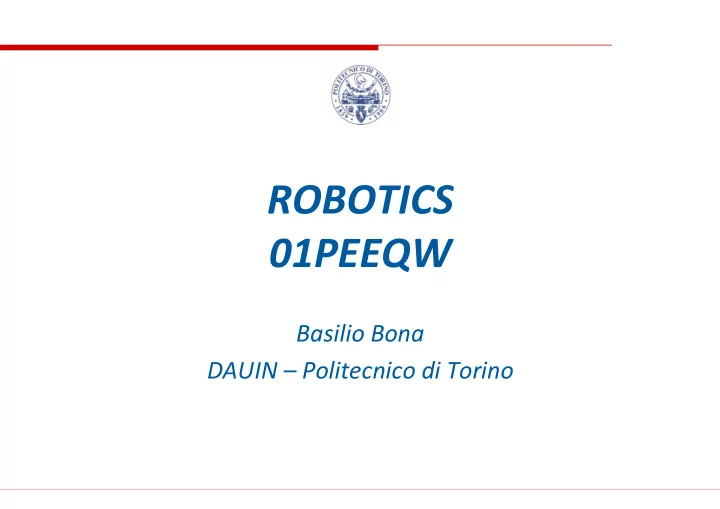

ROBOTICS 01PEEQW Basilio Bona DAUIN – Politecnico di Torino
Probabilistic Fundamentals in Robotics Basic Concepts in Probability
Course Outline � Motivations � Basic mathematical framework � Probabilistic models of mobile robots � Mobile robot localization problem � Robotic mapping � Probabilistic planning and control � Reference textbook [TBF2006] � Thrun, Burgard, Fox, “Probabilistic Robotics”, MIT Press, 2006 � http://www.probabilistic-robotics.org/ Basilio Bona 3
Basic mathematical framework � Basic concepts in probability � Recursive state estimation � Robot environment � Bayes filters � Gaussian filters � Kalman filter � Extended Kalman Filter � Unscented Kalman filter � Information filter � Nonparametric filters � Histogram filter � Particle filter Basilio Bona 4
Basic concepts in probability � In binary logic, a proposition about the state of the world is only True or False; no third hypothesis is considered � Bayesian probability is a measure of the degree of belief of a proposition, or an objective degree of rational belief, given the evidence Basilio Bona 5
Other axioms True A B A ∩ B Basilio Bona 6
Random variables P x ( ) x Basilio Bona 7
Continuous random variables p x ( ) Pr( ) x x a b Basilio Bona 8
Univariate Gaussian distribution Basilio Bona 9
Normal distribution Basilio Bona 10
Normal distribution Basilio Bona 11
Multi-variate Gaussian distribution Covariance matrix Mean vector Basilio Bona 12
Joint and conditional probabilities Basilio Bona 13
Marginal and total Probability Discrete Continuous Basilio Bona 14
Posterior probability and Bayes rule Prior probability distribution Posterior probability distribution Basilio Bona 15
Bayes rule conditioned by another variable Basilio Bona 16
Normalization Basilio Bona 17
Marginal probability Marginal probability Basilio Bona 18
Conditional independence This is an important rule in probabilistic robotics. It applies whenever a variable y carries no information about a variable x , if the value z of another variable is known Basilio Bona 19
Conditional independence ≠ absolute independence conditional independence and absolute independence Basilio Bona 20
Expectation of a random variable � Features of probabilistic distributions are called statistics � Expectation of a random variable (RV) X is defined as Basilio Bona 21
Covariance � Covariance measures the squared expected deviation from the mean Basilio Bona 22
Entropy � Entropy measures the expected information that the value of x carries In discrete case is the number of bits required to encode x using an optimal encoding, assuming that p(x) is the probability of observing x Basilio Bona 23
Robot environment interaction LOCALIZATION PLANNING PERCEPTION ACTION Environment Basilio Bona 24
Robot environment interaction � World or environment is a dynamical system that has an internal state � Robot sensors can acquire information about the world internal state � Sensors are noisy and often complete information cannot be acquired � A belief measure about the state of the world is stored by the robot � Robot influences the world through its actuators (e.g., they make it move in the environment) Basilio Bona 25
State Basilio Bona 26
Complete state Basilio Bona 27
Stochastic process Basilio Bona 28
Markov chains � a Markov chain is a discrete random process with the Markov property � A stochastic process has the Markov property if the conditional probability distribution of future states of the process depend only upon the present state; that is, given the present, the future does not depend on the past. Basilio Bona 29
Environment interaction � Measurements: are perceptual interaction between the robot and the environment obtained through specific equipment (called also perceptions). � Control actions: are change in the state of the world obtained through active asserting forces. � Odometer data: are of perceptual data that convey the information about the robot change of status; as such they are not considered measurements, but control data, since they measure the effect of control actions. Basilio Bona 30
Probabilistic generative laws � Evolution of state is governed by probabilistic laws. � If state is complete and Markov, then evolution depends only on present state and control actions State transition probability � Measurements are generated, according to probabilistic laws, from the present state only Measurement probability Basilio Bona 31
Dynamical stochastic system Temporal generative model Hidden Markov model (HMM) Dynamic Bayesian network (DBN) Basilio Bona 32
Belief distribution � What is a belief: it is a measure of the robot’s internal knowledge about the true state of the environment � Belief is traditionally expressed as conditional probability distributions. � Belief distribution: assigns a probability (or a density) to each possible hypothesis about the true state, based upon available data (measurements and controls) Prediction State belief (prior) Correction/update State belief (posterior) Basilio Bona 33
Bayes filter � Basic algorithm Prediction Update Basilio Bona 34
Mathematical formulation of the Bayesian filter (1) the state is complete Basilio Bona 35
Mathematical formulation of the Bayesian filter (2) the state is complete ... ... Basilio Bona 36
Mathematical formulation of the Bayesian filter (3) � The filter requires three probability distributions Basilio Bona 37
Bayes filter recursion Basilio Bona 38
Causal vs. diagnostic reasoning A rover obtains a measurement z from a door that can be open ( O ) or closed ( C ) Easier to obtain Basilio Bona 39
Example Basilio Bona 40
References � Many textbooks on Probability Theory and Statistics � Bertsekas, D. P., and J. N. Tsitsiklis. Introduction to Probability. Athena Scientific Press, 2002. � Grimmett, G. R., and D. R. Stirzaker. Probability and Random Processes. 3rd ed., Oxford University Press, 2001. � Ross S., A First Course in Probability. 8th ed., Prentice Hall, 2009. � Other materials � http://cs.ubc.ca/~arnaud/stat302.html: slides from the course by A. Doucet, University of British Columbia � video course: http://academicearth.org/lectures/introduction- probability-and-counting: UCLA/MATHEMATICS – Introduction: Probability and Counting, by Mark Sawyer | Math and Probability for Life Sciences Basilio Bona 41
Thank you. Any question? Basilio Bona 42
Recommend
More recommend